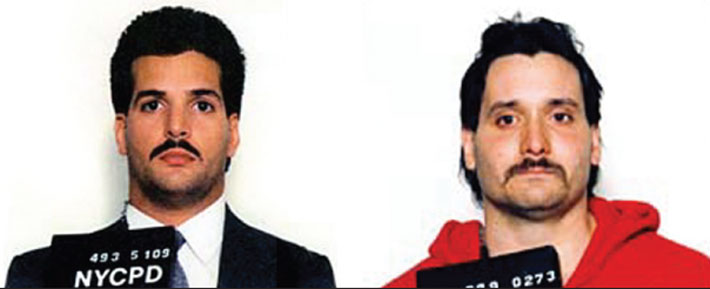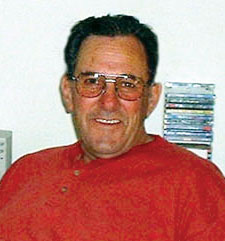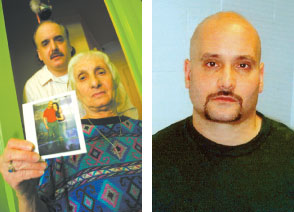• NYS Attorney General’s Office tells Parole Board it is “highly unlikely that Bower committed the crimes”
• Parole Board grants freedom but blasts AG for no exoneration
• March 25 and April 3 hearings
• Family and lawyer still seek justice
Ronald Bower, a 52-year-old father of two from Queens who’s spent the past 22 years behind bars for heinous crimes many believe he did not commit, will finally be coming home to his family.
Bower, whose plight has been the subject of three Long Island Press cover stories, a letter-writing campaign instigated by the newspaper and a Facebook group “Free Ronald Bower” created and maintained by the newspaper, has been granted parole in large part due to a letter written in December from Thomas Schellhammer, the bureau chief of the New York State (NYS) Attorney General’s Office Conviction Review Bureau, urging his release and telling the Parole Board at Clinton Correctional Facility it is “highly unlikely that Bower committed the crimes.”
Schellhammer’s recommendation, however, falls short of tossing out Bower’s convictions or granting exoneration. Thus, Bower—who was convicted of sodomy, sexual abuse and attempted robbery for two sexual attacks in Nassau and Queens—must register as a sex offender and adhere to stipulated guidelines that range dependent upon his risk-level assignment, which will be determined through two NYS Sex Offender Registry Act hearings: March 25 in Nassau and April 3 in Queens. He’ll be released sometime afterward. The NYS Parole Board was consequently saddled with the awkward task of releasing a convicted sex offender who has not been cleared of his crimes by the judicial system—something they hammered NYS Attorney General Eric T. Schneiderman’s Office and Nassau and Queens district attorneys’ offices about during the parole hearing. Prosecutors from both Nassau and Queens district attorneys’ offices complained to the attorney general’s office, stating they were never informed of intentions to parole Bower nor contacted for their respective offices’ case files—a charge Schneiderman’s office strongly refutes.
Schellhammer, an assistant attorney general and former homicide prosecutor in the New York County District Attorney’s Office, is the latest in what has been a growing number of law enforcement officials who’ve supported Bower’s unwavering claims of innocence throughout the years, a list that includes current and former members of the NYS Inspector General’s Office of the state Department of Correctional Services (DOCS), the Federal Bureau of Investigation, state Division of Criminal Justice Services (DCJS) and even members of the very sex crimes unit that originally arrested and charged him.
Regardless of the hubbub between the Parole Board and the three agencies, both Bower’s family and his longtime attorney Jeremy L. Goldberg—Appeals Bureau Chief at the Legal Aid Society of Nassau County, who’s been working on Bower’s case pro bono for the past 20 years—are “jubilant,” says Ronald’s older brother Steve that he is finally coming home and commend the attorney general’s office for helping make that a reality. Neither, however, say they will rest until Bower has been fully cleared of the crimes he’s been convicted.
“We’re happy about his release but we are not going to rest until he is exonerated and justice is done,” says Steve, who has been fighting for his brother’s release since his arrest and caring for their elderly mother ever since.
“I’m very happy that my father’s coming home, but I’m not going to stop all efforts until his name is cleared and he’s exonerated,” vows his daughter Kristy, who was just a toddler when her father was incarcerated and is now a paralegal working for New York City. “I want him to have all the freedom he deserves, and parole is a blessing, but I really want exoneration so that he doesn’t have to fall within the restrictions and the stigma behind being a parolee. It’s just not fair.”
“What does it take for the authorities to recognize his innocence when so many people, their own people, already have?” asks Goldberg. “The big picture, to me—it’s about my client and it’s about ultimately getting him exonerated.”

“I’M INNOCENT!”
Bower had been picked up by Queens sex crimes detectives on May 10, 1991 during his shift at the Douglaston Mall, where he worked as a security guard. The then-30-year-old father of two, who had no prior criminal record, was arrested, made to wear a hooded sweatshirt similar to the one victims described their attacker as wearing, photographed, paraded through several police lineups and eventually charged with two crimes Queens sex crimes unit investigators dubbed the work of the “Silver Gun Rapist”—an assailant eyewitnesses described as having considerably similar physical characteristics to Bower who accosted young women and girls in a series of at least nine sexual attacks through a corridor of eastern Queens and western Nassau counties in the vicinity of Union Turnpike between 1990 and 1991.
The perpetrator’s M.O. was to approach his victims—sometimes two at a time—while they walked or as they entered their vehicles, force or drive them to secluded areas and demand them to perform oral sex on him at gunpoint.
Sometimes, he’d also rape them. Victims described the weapons used as a small silver handgun and a snub-nose .38-caliber revolver. Internally, cops labelled the crimes as “Pattern #1/91.”

While Bower was in custody, the crimes continued, and unbeknownst to he and his attorneys at the time, another man, a New York City police officer named Michael Perez, who had a striking resemblance to Bower, was also arrested and facing trial, accused of raping and sodomizing two women. When police pulled Perez over for erratic driving in relation to one of the incidents, a fully loaded, silver .38 caliber six-shot revolver with a 2-inch barrel was recovered from beneath the driver’s seat.
Perez was off-duty at the times of each pattern attack and eventually became the subject of an Internal Affairs Bureau investigation. He was caught peeping into apartment windows and also in the act of having sex with a prostitute, according to court documents, and resigned shortly afterward.
Yet while Perez was acquitted in both cases—and allowed by police to change into a suit and tie for his mug shot and lineups—Bower received an 18- to 54-year sentence for sodomy, sexual abuse and attempted robbery, with an official maximum expiration date of May 3, 2041.
He has insisted his innocence ever since, which has often led to added friction within various prisons throughout New York State; because of his professed innocence, he refused to participate in mandated rehabilitation classes for sex offenders.
Schellhammer outlined his reasoning for Bower’s release in his Dec. 30, 2013 letter, explaining that his bureau had been investigating Bower’s claims of innocence “for some time,” a probe that included speaking with investigators and witnesses associated with the crimes he was convicted of in an attempt to reconstruct those events “to the best of our ability.”
“Unfortunately, due to the passage of time and the loss of some crucial evidence, we are unable to completely do so,” he writes. “Some witnesses have been uncooperative with the Conviction Review Bureau procedures. Accordingly, we are unable to fully close our investigation at this time.”
“This position is based upon several factors,” the letter continues. “a) His physical resemblance to another person who committed identical crimes at about the same time as these in question, some of which occurred after Bower was in custody; b) the possible mis-identification of Bower as the perpetrator of these crimes by the victims; c) the lack of a propensity or any other prior indicator that Bower was inclined to commit offenses of a sexual nature; and d) the probability that Bower had an alibi for the nights in question.”
“In light of these factors, I urge the Parole Board to grant Mr. Bower parole at its earliest convenience,” Schellhammer adds, noting that Bower’s is the only case to date that his office, which was created in 2012, has asked the Parole Board to consider granting parole to an inmate. “As a prosecutor, I am aware of the elements that the Parole Board looks to when considering granting parole, and I am aware that Bower has never fully accepted responsibility for these crimes. Considering what the Bureau has learned about the facts of these crimes, I believe there is ample reason for Bower not to do so. In any event, given that Bower has now been incarcerated for twenty years, I believe that society’s best interests are served by granting him parole.”
The Parole Board at Clinton Correctional Facility, however, did not grant Bower’s freedom without first blasting the Attorney General’s Office at Bower’s Jan. 21, 2014 parole board hearing for putting them in the uncomfortable position of releasing a convicted sex offender and for failing to seek full exoneration.

“JUST DISMISS THESE CHARGES”
“I am greatly disturbed that a prosecutor—and unlike any other attorney in the system, not even a judge—a prosecutor is charged with doing justice,” slammed Commissioner James Ferguson, according to a transcript of the proceeding. “That means doing the right thing. If they feel so strongly about this, I’m shocked and dismayed that they have not had—let me say it politely—the fortitude to come forward and just dismiss these charges.
“Instead, they’re trying to convince the Parole Board to take the responsibility for releasing you on a pretty egregious offense because they don’t have—again, I’ll say it politely—the fortitude to come forward and basically release you or dismiss the charges or petition the court for your release,” he told Bower. “So that’s to me very disappointing.”
“I am dismayed, if they feel so strongly, they have not taken their own action to secure your release, hoping that the Parole Board would give this weight to the letter that they have submitted and make a decision,” Ferguson reiterated.
Commissioner Lisa Beth Elovich also weighed in, taking additional aim at Nassau and Queens district attorneys’ offices.
“I too as a former prosecutor and someone that’s been involved in the criminal justice system for 23 years, find this shocking and I find this very, very disturbing the way this has been handled by the judicial system, the DA’s office, and anyone else involved in this,” she said. “What they are virtually doing is putting the Parole Board in a terrible position because as a Parole Board, we are charged to assume that the person that is in prison is guilty of what they’re in prison for because we do not have the resources to retry a case.
“We don’t have the witnesses—we don’t have sworn witnesses, we don’t have documentation, we don’t have the evidence, we can’t cross-examine people. We don’t have any of those things at our disposal,” Elovich continued. “So there is a reason why we don’t retry a case. The District Attorney’s Office, however, has those resources in terms of what they have as sworn testimony, documentation, evidence.
“So the fact that the DA’s office and all other prosecuting entities that have been involved in this have not taken a stand either way, to go ahead and say that this person is not guilty of what they’re in here for, I find that extremely disturbing,” she told Bower, “and the fact that an Attorney General…would personally write a letter saying that they feel that you are not guilty of the crime that you’re in here for and their only recourse they think is the Parole Board to release you, is a very deep concern. I don’t understand why this would not have been taken to a judge or some other judicial forum that would have the authority to release you based on lack of evidence or any other reason they can think of why you would not be guilty of what you’re in here for.
“It does put the Parole Board in a very bad position.”

Nassau and Queens prosecutors are also perturbed. Neither were copied on the Attorney General’s letter or apprised of the office’s conclusions, writes Nassau County Chief Assistant District Attorney Madeline Singas in a Feb. 28, 2014 letter to Chief Deputy Attorney General Harlan Levy, Esq. Neither were contacted by the Attorney General’s Office in order to review Bower’s files, either, she contends—a claim that Attorney General Eric Schneiderman’s office “vigorously disputes,” according to the New York Law Journal, which published an article about Bower and his release in their most recent issue.
“While we applaud the Attorney General’s creation of this new bureau, it is troubling that this review was undertaken without a review of the case files held by the District Attorneys of Queens or Nassau County,” she blasts. “Mr. Schellhammer’s letter to the Parole Board contains a single paragraph to support his conclusion that ‘it appears highly unlikely that Bower committed the crimes for which he was convicted.’ While those claims of innocence have been substantially reviewed and rejected by the prior Nassau County District Attorney’s administration, the Queens District Attorney’s Office, and examined and rejected by both state and federal courts, this office is prepared to fully re-examine this case immediately if warranted.
“Thus far, when we have asked to provide the office with any new or exculpatory evidence in order to facilitate any appropriate release of Mr. Bower from custody, you have declined to do so,” Singas continues. “Once again, I respectfully request that your office immediately share with us the evidence that supports the findings outlined in Mr. Schellhammer’s letter.”
Nassau District Attorney Kathleen Rice’s Office only became aware of the Attorney General’s correspondence with the Parole Board and its conclusion, she writes, from a media inquiry—the Law Journal’s.
Bower, whose horrific tours around the most brutal prisons throughout the state—Auburn, Gowanda, Green Haven, Sullivan, Clinton—have wrought him and his family immeasurable pain and anguish, told the Parole Board at his hearing that: “I’ve been crying almost every day.”
“I’m innocent!” he told this reporter, his eyes welling up with tears during a jailhouse interview at one of those hellish facilities. “You have to believe me… I never hurt anyone.”



























